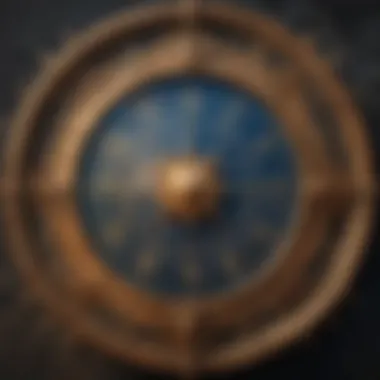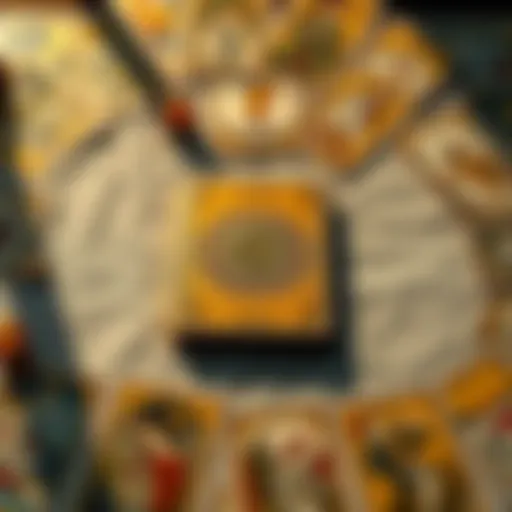Astrological Insights: Personal Horoscope Predictions


Intro
Astrology, often seen as a mystical guide, connects our lives to the cosmos. People have been fascinated by the stars and planets for centuries, believing that celestial movements at the moment of their birth can influence their destinies. It's not just about the sun sign we hear about in casual conversations, but a complex tapestry woven from the planets’ positions, angles, and phases at the time of our entry into the world. This article delves deeper into how your birth date and time can inform personalized predictions that resonate with your innate characteristics.
A horoscope is like a snapshot of the heavens, capturing the positions of celestial objects on the day you were born. Understanding this slice of cosmic history leads to insights—material for growth, awareness, and direction.
In the sections ahead, we will explore zodiac profiles, compatibility dimensions, and significant astrological events, providing you with a roadmap of your celestial journey. The culmination of this knowledge isn’t just theoretical; it offers practical tools for navigating life's challenges and enhancing personal development.
So, whether you’re a seasoned astrology buff or someone just dipping your toes into the celestial waters, let’s embark on this delightful exploration together.
Preface to Horoscope Predictions
Horoscope predictions, often seen as whimsical, hold a significant sway in personal and spiritual lives. These forecasts are not simply about astrology; they reflect an interplay between cosmic events and individual experiences. By examining the connection between celestial movements and one’s birth data, individuals can glean insights into potential life paths and personal tendencies. The engagement with horoscope predictions encourages self-reflection and offers a roadmap to navigate life's complexities.
Understanding Astrology
Astrology is an ancient discipline that connects human experience to the movements and positions of celestial bodies. It's all about the notion that the stars and planets sway our fates here on Earth. Each birth carries with it a unique chart, shaped by the exact timing and place of one's arrival. This chart serves as a map, offering clues about personality traits, emotional needs, and life trajectories. While some might dismiss astrology as mere superstition, many enthusiasts find genuine value in exploring how these cosmic patterns resonate with their daily lives.
By understanding astrology, one begins to appreciate the nuances of personal growth, relationships, and even career choices. It’s a practice steeped in history, with roots in various cultures, making it not just an art but a deeply embedded tradition. The study of astrology equips individuals with the tools to discern their strengths and weaknesses, guiding them towards more informed decisions.
The Role of Birth Data
The significance of one's birth date and time cannot be overstated in the realm of astrology. Birth data plays a pivotal role in constructing one’s astrological chart, which is tailored to the individual’s cosmic imprints. This chart includes key components like planetary positions, houses, and aspects, each shedding light on varied life areas.
The more precise the birth data, the more refined the interpretations. Take, for example, a person born on the cusp of two signs—without accurate birth time, their true astrological identity may be fuzzy. This precision enables astrologers to delve deeper into elements like:
- Sun Signs: Representing core personality traits and ego.
- Moon Signs: Highlighting emotional responses and instincts.
- Rising Signs: Indicating how a person presents themselves to the world.
"Astrology is a language. If you understand this language, the sky speaks to you." - Dane Rudhyar
Ultimately, understanding and utilizing the insights derived from one's birth data is key for anyone looking to unlock their astrological potential. A personalized horoscope can provide clarity, aiding individuals during times of uncertainty. Each birth chart is a unique story, waiting to be told, offering rich insights and opportunities for self-discovery.
The Mechanisms Behind Horoscope Creation
Understanding the mechanisms behind horoscope creation is crucial for anyone looking to delve into astrology. These mechanisms serve as the backbone to interpreting how celestial bodies influence individual lives. Grasping these concepts can help both enthusiasts and skeptics recognize the nuances in astrological readings, ensuring that personal insights gained are authentic and precise. In this section, we will explore the astrological chart, planetary positions, and the significance of houses in astrology—all of which harmonize to create an intricate web of possible interpretations.
The Astrological Chart
The astrological chart, often referred to as the natal chart or birth chart, serves as a map of the heavens at the moment of an individual's birth. It is a unique snapshot that contains the positions of the sun, moon, planets, and other celestial bodies relative to Earth and to each other. This personalized chart is essentially the foundation upon which astrological predictions are built.
The importance of the astrological chart cannot be overstated, as it lays out the potential pathways that can be explored. Each element within the chart, from the Sun's placement to the Moon's phases, reveals unique aspects of an individual's personality, challenges, and opportunities. Furthermore, understanding the positions and relationships between celestial bodies can help identify periods of growth or difficulty, aiding in personal development and decision-making.
Planetary Positions
Planetary positions significantly impact horoscope interpretations. Each planet is associated with specific energies and characteristics. For example, Venus often embodies love, beauty, and finance, while Mars is linked to action, desire, and assertiveness. The position of these planets at the time of birth can inform us about various aspects of life, including romantic relationships, career trajectories, and even personal conflicts.
When interpreting the planetary positions, astrologers often consider aspects, or the angles between planets. Positive aspects can suggest harmony and ease, while challenging aspects might indicate conflicts or hurdles. By examining these planetary alignments, astrologers are able to provide insights that resonate deeply with the individual's life circumstances.
Houses in Astrology
The houses in astrology represent different areas of life, such as career, relationships, and personal growth. Each house corresponds to a particular segment of the zodiac and has its own meanings and influences. For instance, the first house is often associated with self-identity, while the seventh house pertains to partnerships and marriage.
Understanding which planets occupy these houses helps to clarify their roles in the individual's life. Moreover, the interactions between planets and houses can reveal significant themes or lessons that the individual may encounter. This layer of interpretation adds depth to horoscopic predictions, moving beyond mere generic traits associated with a particular zodiac sign.
In summary, the mechanisms behind horoscope creation lie in the intricate interplay between the astrological chart, planetary positions, and houses. Each component works in concert to provide personalized insights, ultimately enriching our understanding of life's journey.
By recognizing these components and their significance, those interested in astrology can engage more fully with their personal horoscopes. Instead of mere predictions, what emerges is a reflective tool for navigating life with clarity and intention.
Using Birth Time for Accurate Predictions
Understanding the significance of one’s birth time is akin to unlocking a treasured chest brimming with insights that can shape personal narratives. The birth time is not just a detail, but a crucial factor that influences the accuracy of astrological predictions. When creating horoscopes, knowing the precise moment of one’s arrival can lead to more tailored interpretations, which reflect an individual's path more vividly.
One key element of using birth time effectively lies in the concept of house placements. Each astrological house signifies different areas of life—relationships, career, and family, among others. The time of birth determines which sign rules each house at the moment of birth. For example, if someone is born right at dawn, their first house might be influenced significantly by the characteristics of Aries, suggesting a strong initiative and assertiveness in their personality approach.
The benefits of precise timing extend beyond mere curiosity. For those serious about their astrological forecasts, the accuracy of predictions can greatly enhance decision-making. When you understand the nuances of how planetary positions interact with your unique birth time, you can gain insights into optimal times for making changes, pursuing opportunities, and even personal reflection.
However, it’s worth considering some aspects of getting the birth time right. If an individual is unsure of their exact time of birth, it may lead to a less accurate horoscope. Astrologers sometimes rely on rectification techniques, trying to deduce this time based on significant life events. But can't help wondering, how much more beneficial would it be if they had the precise time from the start?


"Astrology is like a map of your potential, but you need the right coordinates to navigate it effectively."
The Importance of Precise Timing
Drilling deeper into this topic, one cannot overstate the importance of precise timing in creating horoscopes. In astrology, two individuals born on the same day can have completely different charts if they are born hours apart. The energetic influences of celestial bodies shift as the Earth rotates, thus tinting the astrological map according to the timing of one’s birth.
For instance, if you were born at noon, the Sun might be in your tenth house, indicating a strong public persona or career focus, whereas a birth at midnight could place it in the fourth house, suggesting more emphasis on home and family life. The shift from the solar noon to midnight emphasizes how timing alters perspectives on challenges and strengths.
Additionally, different planetary aspects unfold based on specific hours. For example, a 6 AM birth time versus a 6 PM birth time would align the Moon differently relative to other planets. This means your emotional world and instinctual reactions can vary greatly based on when you entered the world. Hence, when seeking deeper insights, the more specific the timing, the clearer the picture.
Effects of Time Zones
When discussing effects of time zones, the conversation takes a more complex turn. Birth time doesn’t just hinge on seconds. It also involves understanding the geographical context of that moment, which ties back to time zones. For instance, if a person was born in New York and another in Los Angeles on the same day, their charts can display profound differences simply based on the three-hour time difference.
To illustrate this, consider a birth at 3 PM in New York versus a birth at 12 PM in Los Angeles. The planetary positions would shift noticeably affecting not just the zodiac signs of the individual but also the elemental dynamics at play. Factors such as Daylight Saving Time can add an additional layer of complication, making accuracy even more paramount when calculating the time of birth.
This is why astrologers often utilize Universal Time Coordinated (UTC) conversions, streamlining the process, thus enabling them to accurately position celestial bodies against the Earth’s rotation. Having clarity on time zones ensures that the individual’s chart truly resonates, providing insights that can ring true throughout various life phases.
In summary, the fine details concerning birth time and time zones are fundamental for drafting an astrological narrative that reflects more than mere apocalyptic forecasts. This precision wraps around the very essence of one's chart, enriching the understanding of one’s place within the cosmos.
Zodiac Signs and Personal Traits
Understanding zodiac signs is essential for anyone delving into astrological insights. The way a person views the world, interacts with others, and makes decisions is often attributed to their zodiac sign. Each sign reflects specific traits that not only enhance one’s personality but also influence life choices. Acknowledging these attributes can be a game changer in personal development and understanding interpersonal dynamics.
Understanding Zodiac Elements
The zodiac comprises four fundamental elements: Fire, Earth, Air, and Water. Each element comprises three signs, and this elemental categorization brings depth to the characteristics of each sign.
- Fire Signs (Aries, Leo, Sagittarius): Known for their passion and energy, these individuals often radiate confidence and enthusiasm. They are natural leaders but may struggle with impulsiveness.
- Earth Signs (Taurus, Virgo, Capricorn): Practicality and reliability define them. Earth signs crave stability and are grounded in their approaches, making them excellent planners.
- Air Signs (Gemini, Libra, Aquarius): Intellectual and communicative, air signs thrive on social interactions and ideas. Yet, they can sometimes come off as aloof or detached.
- Water Signs (Cancer, Scorpio, Pisces): Deeply emotional and intuitive, water signs navigate the world through their feelings. They may excel in empathy, but emotional turmoil can also affect them heavily.
This elemental framework explains much about personal traits and serves as a foundation for interpreting individual behavior. Consequently, knowing one’s sign can assist individuals in harnessing their unique strengths and mitigating weaknesses.
Characteristics of Each Sign
Every zodiac sign embodies specific traits that can offer profound insights about an individual. Here’s a snapshot of each sign’s characteristics:
- Aries (March 21 - April 19): Energetic, adventurous, sometimes impulsive.
- Taurus (April 20 - May 20): Stubborn yet dependable. Value comfort and security.
- Gemini (May 21 - June 20): Versatile and chatty, but can be indecisive.
- Cancer (June 21 - July 22): Nurturing yet moody. Strong connection to family.
- Leo (July 23 - August 22): Charismatic and confident, eager for the spotlight.
- Virgo (August 23 - September 22): Detail-oriented and practical, may appear critical.
- Libra (September 23 - October 22): Diplomatic and fair-minded, struggles with decision-making.
- Scorpio (October 23 - November 21): Intense and passionate, they often guard their emotions closely.
- Sagittarius (November 22 - December 21): Optimistic and freedom-loving, may lack tact.
- Capricorn (December 22 - January 19): Ambitious and disciplined, can be pessimistic.
- Aquarius (January 20 - February 18): Innovative and unconventional, though they may seem aloof.
- Pisces (February 19 - March 20): Artistic and compassionate, they often escape reality.
Understanding these traits not only provides an insight into how someone may react in everyday situations but also into deeper, more complex emotional responses.
"Astrology reveals the potential energy that is present in each person, aligned with their birth sign, providing a roadmap of personality traits to navigate life’s twists and turns."
Interpreting Horoscope Predictions
Understanding how to interpret horoscope predictions is vital for anyone interested in astrology. The act of interpretation allows individuals to glean insights from their unique birth charts, highlighting influences that might affect various aspects of life, such as career, relationships, and personal growth. Furthermore, knowing how to decipher these predictions empowers enthusiasts to make informed decisions, enhancing their life experiences based on celestial guidance.
Astrology isn’t just about understanding one’s zodiac sign; it’s intricately tied to the positions and alignments of planets at the precise time of birth. This nuanced approach transforms generalizations into tailored advice that resonates with the individual’s life story. By interpreting these details through a personal lens, one can reveal layers of meaning that might otherwise remain hidden.
Beyond personal insight, interpreting horoscopes can foster a deeper understanding of what drives people's behaviors and choices. This can enrich relationships and community connections, as individuals learn to appreciate differing perspectives shaped by astrological influences.
Key Aspects of Interpretation
The interpretation of horoscopes revolves around several key elements, each contributing to a fuller understanding of personal astrological forecasts:
- Sun, Moon, and Rising Signs: These core components often dictate personality traits, emotional responses, and outward behavior. For instance, a person with a Leo Sun may exhibit confidence, while a Cancer Moon could indicate a sensitive emotional nature.
- Planetary Aspects: The angles formed between planets in the chart can reveal how different influences interact in a person's life. A harmonious aspect might indicate ease and support in a particular area, while a challenging aspect could signify where growth is necessary.
- Transits: Understanding how current planetary movements impact natal positions can offer predictive insights. A Saturn transit, for example, might signal a time for hard work and discipline, while a Jupiter transit could herald opportunities for expansion and optimism.
- Houses: Each house of the horoscope represents different life areas, from personal finance to relationships. Identifying which planets are located in which houses can clarify where the most significant influences will manifest.
"Interpreting horoscopes helps individuals transform celestial symbols into personal narratives and insights, guiding them in their choices and experiences."
Common Misconceptions
Many misconceptions surround astrology and horoscope interpretation, often fueled by media portrayals and oversimplification. Here are a few notable myths:
- Horoscopes are Just Predictions: Many folks regard horoscopes as a sort of fortune-telling. In reality, they offer guidance rather than definitive outcomes. They reflect potential influences but do not dictate actions.
- Daily Horoscopes Are Accurate for Everyone: While these can be fun, daily horoscopes based on sun signs lack depth. Individual charts tell a much more intricate story.
- All Astrology is the Same: Astrology is diverse, with different systems like Western astrology, Vedic astrology, and Chinese astrology. Each has unique methodologies and interpretations.
- A Zodiac Sign Determines Personality Fully: While your sun sign plays a crucial role, it’s the entire natal chart that provides a comprehensive picture of one's personality and life challenges.
In navigating these misconceptions, readers are encouraged to take a more nuanced and educated approach to interpreting horoscopes. Through understanding the complexities and subtleties of astrology, individuals can deepen both their self-awareness and their grasp of how the universe reflects on their life experiences.
Personalization of Predictions


Personalizing horoscope predictions is crucial when it comes to deriving meaningful insights from astrology. Rather than settling for generalizations, tailoring analyses to individual contexts can prove invaluable. When a prediction aligns closely with personal experiences and backgrounds, it holds much more weight. Each person's life journey is distinct, influenced not only by celestial movements but also by personal decisions, cultural backgrounds, and life experiences.
One of the primary elements in personalization is adding individual context. This means recognizing factors such as an individual's life stage, aspirations, and personal challenges. For instance, two people might share the same zodiac sign yet face vastly different circumstances and goals. The nuances of their life paths can lead to different interpretations of how astrological transits may influence them. Therefore, understanding one's individual narrative is essential for creating relevant and constructive predictions.
Adding Individual Context
Adding individual context starts with introspection. One must engage in a self-reflective practice to identify personal desires and obstacles. Questions like "What challenges am I currently facing?" or "What are my goals for the coming year?" can provide a roadmap for integrating astrology into practical life. By aligning astrological insights with these personal reflections, individuals can gain a clearer perspective on how the cosmos might play a role in their journey.
Astrologers can leverage this context by analyzing not just the zodiac sign, but also the moon's position, ascendant, and other planetary movements at the time of birth. This multi-layered approach leads to a richer interpretation of a person's chart. For example, a person with Aries sun and Libra moon may express assertiveness in public but feel sensitive in private relationships. Recognizing this internal battle can offer a more nuanced prediction that resonates deeply with their experience.
Combining Factors for Accuracy
Combining factors for enhanced accuracy in predictions encompasses several key components. To elucidate, one must consider various astrological aspects, including transits, progressions, and planetary aspects. Here’s how to effectively combine these elements:
- Transits: The current movement of planets relative to their original positions at your birth can highlight potential changes or opportunities. Paying attention to when Jupiter transits your natal sun can signal a period of growth and abundance.
- Progressions: This technique involves moving your natal planets forward in time. It often reveals inner growth or maturity that coincides with real-world events.
- Planetary Aspects: Examining the angles between planets at the time of reading can uncover relationships that affect personality traits and life events. For instance, a square aspect may indicate tension but can also encourage growth if harnessed correctly.
Combining all these factors creates a robust framework for predictions, allowing you to see the bigger picture. For astrology enthusiasts, synthesizing these elements yields more enriching insights and empowers them to navigate life’s ebb and flow with confidence.
Astrological insights, when personalized, become a powerful tool, illuminating possibilities and guiding choices.
Astrological Compatibility
Astrological compatibility plays a crucial role in understanding how individuals relate to one another through the lens of their zodiac signs. The interactions influenced by the celestial bodies at the time of birth provide insights into various dynamics of relationships, be it romantic, platonic, or even professional. Astrology suggests that the positions of the planets create a structured map that highlights potential harmony or discord between different signs.
Understanding compatibility means looking beyond just the sun signs. Each zodiac sign carries its unique traits, strengths, and weaknesses. Thus, compatibility is built on the intricate interplay of various astrological elements, such as the moon, rising signs, and even the houses they inhabit. By recognizing these combinations, individuals can navigate their relationships with more awareness and insight.
Zodiac Pairing Dynamics
When discussing zodiac pairing dynamics, it is essential to note that compatibility isn’t merely about whether two individuals share the same sign. Rather, it involves how different signs interact within their elemental categories—fire, earth, air, and water. Each element has its characteristics:
- Fire Signs (Aries, Leo, Sagittarius) tend to be passionate, enthusiastic, and spontaneous, often igniting enthusiasm in their partners.
- Earth Signs (Taurus, Virgo, Capricorn) are grounded, practical, and dependable, providing stability and support to their relationships.
- Air Signs (Gemini, Libra, Aquarius) are intellectual, social, and communicative, bringing lightness and adaptation to their interactions.
- Water Signs (Cancer, Scorpio, Pisces) are emotional, intuitive, and nurturing, often creating deep connections but can also be sensitive.
Pairing these elements reveals dynamic patterns. For instance, fire and air can create an exciting blend where ideas flow and creativity flourishes, while earth and water may lead to a nurturing and stable partnership where both practical needs and emotional support are met. Each combination presents its potential and pitfalls. The essence here is to embrace the strengths and work through the weaknesses offered by these pairings.
Factors Influencing Relationships
Numerous factors come into play when evaluating astrological compatibility. Besides the sun signs and their elemental interactions, several other variables can influence how relationships unfold:
- Moon Signs: Reflect emotional aspects and how individuals respond to feelings, shaping intimacy levels.
- Rising Signs (Ascendant): Indicate how a person presents themselves to the world, impacting first impressions and attraction.
- Venus and Mars Placement: Venus governs love, affection, and harmony, while Mars influences desire and passion. Understanding these positions can reveal the nuances of attraction.
- Astrological Houses: Each house represents different areas of life, such as home, relationships, and career. The placement of planets within these houses affects how different aspects of relationships manifest.
Compatibility in astrology isn’t a rigid rule but a spectrum of possibilities, requiring both self-awareness and sensitivity towards differences.
Life Events and Astrology
Understanding how astrology intertwines with significant life events can illuminate the paths we traverse. By analyzing the relationship between celestial alignments and personal milestones, individuals can uncover insights that may help them navigate through life's complexities. The role of astrology in marking important moments—be it a career change, a relationship milestone, or the start of a new venture—invites examination of how planetary influences shape our experiences.
Astrology acts like a compass, guiding us through various life phases. It helps us understand not just when to act but also when to pause and reflect. Recognizing the patterns within our birth charts can lead to a deeper awareness of our life cycles and decisions. This understanding enhances our ability to prepare for changes, making it clear that astrology is not merely about prediction; it also serves as a tool for empowerment and informed decision-making.
Timing Life Changes by Birth Chart
The timing of life changes can often feel haphazard or beyond our control. However, through the lens of astrology, many believe these changes are influenced by the configuration of celestial bodies at our birth. Every individual’s natal chart provides unique insights into major life events and periods of change.
For instance, consider someone with a strong emphasis on their Saturn return. This astrological event often signifies a time of reckoning, where individuals confront responsibilities, facing pivotal milestones typically around the ages of 29 and 58. During these times, personal growth usually occurs, reflecting the lessons that the universe presents based on one's chart.
Consequently, planning significant life transitions, such as starting a family or pursuing a new career, becomes more nuanced. Astrological forecasts can help individuals align their actions with opportune times, rather than pushing against the tide.
"Astrology allows individuals not only to prepare for potential changes in their lives but also to probe deeper into their innate strengths and weaknesses, guiding them through life's twists and turns."
Astrological Forecasting Techniques
Astrological forecasting is a practice that allows enthusiasts to glimpse into the future based on their personal horoscopes. Several techniques exist that cater to individuals keen on understanding the influence of celestial movements on daily life.
- Transits: This method examines the current positions of planets relative to those at the time of birth. It highlights how these movements can affect emotions, relationships, and significant decisions.
- Progressions: An advanced technique where the natal chart evolves over time, offering insights into personal growth and development phases. Understanding progressions can help to interpret the changing energies in one’s life.
- Solar Returns: A forecast determined by the position of the sun at the time of one’s birthday each year. This technique maps out the themes and events for the upcoming year, often drawing attention to specific areas of focus in personal and professional life.
- Synastry: This technique looks at the astrological compatibility between two charts. It sheds light on personal relationships and dynamics, providing a unique perspective on romantic or platonic partnerships.
In summation, by employing various astrological forecasting techniques, individuals can gain a clearer picture of their life's trajectory. Astrology emphasizes the importance of timing and preparation, turning the seemingly random tides of change into opportunities for growth and enlightenment.
Criticism and Skepticism in Astrology
Astrology has fascinated many for centuries, weaving itself into the fabric of countless cultures. Yet, with this fascination comes scrutiny. The criticism and skepticism in astrology stem from diverse perspectives. It's crucial to acknowledge this dialogue as it opens pathways for deeper understanding. This section unveils important debates in the astrological community and highlights scientific perspectives that challenge astrological validity.


Debates in the Astrological Community
Within the astrology community, discussions can be vibrant but polarizing. Advocates passionately defend astrology as a worthy pursuit, while skeptics often dismiss it. A key point of contention involves whether astrological interpretations can yield meaningful insights into human behavior or destiny.
Many practitioners argue that astrology offers a framework to comprehend life events and personal tendencies. They claim it guides individuals in decision-making and personal growth. For example, creative types might consult their horoscopes to identify favorable periods for new projects, while romantic souls may seek compatibility insights through synastry.
On the flip side, skeptics argue that astrology lacks empirical support. Critics argue that observable outcomes based on astrological predictions remain unproven. The debate often centers around:
- Subjectivity of Interpretation: Different astrologers may provide varied readings based on the same birth chart.
- Cognitive Bias: Some believe individuals may recall only the predictions that come true and forget those that do not.
- Generalization: Critics argue that horoscopes often apply broad statements that could relate to anyone.
These ongoing debates serve not only as reflective discussions but as catalysts for scrutiny leading to a deeper appreciation of astrology's complexity—and perhaps even its faults.
Scientific Perspectives
The skepticism toward astrology often originates from a scientific view that prioritizes empirical evidence and reproducibility. In this realm, astrology is frequently viewed through a critical lens. Critics argue that lack of scientific backing proves astrology's failures. Key points include:
- Lack of Causation: Skeptics argue there is no demonstrable link between celestial movements and human personalities or life events.
- Falsifiability: A hallmark of scientific theories is their ability to be tested and potentially disproven, which skeptics claim astrology fails to achieve.
Moreover, various studies have sought to correlate astrological predictions with actual outcomes. Most have found minimal to no statistical connection. For instance, two well-known studies concluded that astrological signs did not reliably predict personality traits in test subjects.
Despite criticism, some scientists take a different approach. They explore the psychological underpinnings that might explain astrology's enduring popularity. There's a thought-provoking notion that astrology may satisfy a human need for meaning and purpose, especially in life's uncertain times.
"The appeal of astrology lies not in its accuracy but in its ability to provide individuals with a sense of direction amidst chaos."
Practical Applications of Horoscope Insights
Astrological insights gleaned from horoscope readings serve as a powerful tool in guiding individuals through life decisions and personal growth. Astrology can often feel mystical, yet the practicality of these insights is rooted in their ability to help people understand themselves better and navigate their choices with more clarity. This part of the article delineates how horoscopes can be applied actively in everyday situations and long-term planning.
Horoscope insights can illuminate paths that might be less obvious at first glance. As such, the individual birth chart, comprising planetary positions and astrological signs, offers a tailored roadmap. The importance of this subject lies in harnessing the cosmic energies to align personal ambitions with astrological timing.
"Astrology serves as a compass in the chaotic landscape of life, revealing directions that resonate with universal energies."
Knowing one’s astrological aspects provides significant advantages in decision-making and fostering personal development. Below, we delve into two practical aspects in particular.
Navigating Life Decisions
Navigating through life's multitude of decisions can be challenging, and astrology provides a unique lens through which these choices can be examined. Each zodiac sign is associated with specific traits and tendencies, and understanding these can have profound implications on major decisions. For example, an individual born under Capricorn might naturally be more inclined to seek stability in career choices, while a Gemini might thrive in dynamic, ever-changing environments.
When utilizing horoscopes as a decision-making tool:
- Identify Strengths and Challenges: Knowing your moon sign or rising sign can reveal more about emotional readiness and adaptability. This awareness allows individuals to play to their strengths.
- Timing is Everything: Some decisions are better made at particular times. Understanding lunar phases or retrograde cycles provides insights into when to take action or when to hold back.
- Compatibility Considerations: Relationships often benefit from astrological insights, particularly in romantic pursuits. Knowing whether a potential partner's sign complements yours can help forecast potential compatibility and understanding between the two.
Personal Development through Astrology
Astrology is not just about predicting the future; it also offers tools for personal growth. Many individuals turn to their horoscopes for encouragement to develop in specific areas of life. By aligning self-improvement strategies with astrological insights, one can gain deeper self-awareness and foster emotional resilience.
Key benefits of astrology-centered personal development include:
- Self-Understanding: Recognizing the influences of planetary transits can serve as a reflective exercise. For instance, a stressed month influenced by Mars can remind someone to take care of their physical health.
- Goal Setting: Aligning personal objectives with auspicious dates determined by astrology allows individuals to set meaningful goals that resonate with celestial movements.
- Stress Management: Having a grip on astrological trends can help mitigate stress by preparing individuals beforehand for periods of difficulty, potentially reducing feelings of unexpected challenges.
In summary, the practical applications of horoscope insights are as varied as the individuals who seek them. By enabling informed life decisions and nurturing personal development, astrology becomes a relevant practice that adapts to changing life circumstances while offering valuable perspectives. Individuals and astrology enthusiasts can turn to their charts not just for foresight but as a means of reflection and understanding their unique place in the universe.
Future Trends in Astrology
In an ever-evolving world, astrology is not left behind. The future trends in astrology are crucial to understanding how age-old wisdom can interlace with modernity, paving a path for fresher insights into personal growth and decision-making. As society becomes more attuned to holistic approaches, astrology merges with tech-driven methodologies, enriching the traditional practices.
Moreover, understanding these trends can empower individuals to keep abreast of the latest interpretations, potentially enhancing the accuracy and relevance of their astrological readings. This section delves deep into emerging trends, demonstrating their significance for astrology enthusiasts searching for meaningful clarity in turbulent times.
Integration with Technology
The integration of technology into astrology reflects the growing interest in personalization and accuracy. With the rise of mobile applications and online astrological platforms, users can now access their birth charts, daily horoscopes, and compatibility reports at a touch of a button.
- Astrological Apps: Popular apps like Co–Star and The Pattern analyze personal data and provide tailored insights based on an individual's unique chart. By offering notifications about significant astrological events, these apps keep users engaged and informed.
- Online Calculators: Websites like Astrodienst allow users to input their birth data to generate detailed charts instantly, making astrology more accessible to the masses.
- Social Media: Platforms such as Reddit and Facebook have communities where enthusiasts share insights and experiences, creating a rich tapestry of knowledge exchange among users.
"Astrology meets technology, making ancient wisdom vastly more accessible than ever."
However, with such growth, there comes a responsibility to discern quality information from superficial readings. Navigating through an ocean of available data necessitates a critical eye, ensuring that individuals benefit from well-researched insights rather than poorly substantiated claims.
Evolving Interpretations
As the world changes, so do the interpretations of astrological insights. The evolving nature of astrology captures how contemporary issues, cultural shifts, and even scientific advancements influence the understanding of celestial phenomena. This dynamic approach allows astrology to remain relevant and resonate strongly with new generations.
- Cultural Influences: With globalization, different astrological practices, such as Vedic and Western astrology, are beginning to merge. This mixing of cultural perspectives brings a broader understanding, appealing to a more diverse audience.
- Scientific Considerations: As people become more scientifically literate, the intersection of astronomy and astrology sparks renewed debates. Serious astrologers now find ways to incorporate scientific language and concepts to bridge the gap between faith and reason.
- Personal Narratives: People are starting to engage with astrology on a more personal level, prompting a shift toward narrative astrology, where the focus is on individual stories rather than pure statistical readings. This gives astrology its human touch, emphasizing how each person’s journey can be informed by celestial movements.



